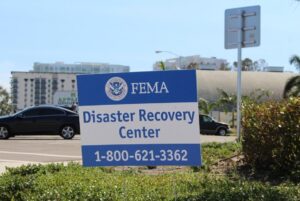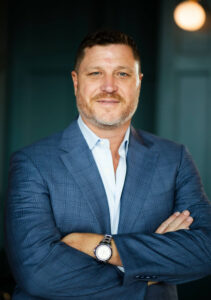We look at FEMA, adjusters, and the shape of the insurance industry following Milton’s landfall.
By Johannes Werner
Original Air Date: October 16, 2024
Host: It’s been one week since the storm, and insurance is on everybody’s mind. We have a look at FEMA application lines in Sarasota, and we talked to an adjuster while he was stuck in traffic to the islands, as well as to an advocate for insurance reform.
Johannes Werner: Let’s begin with affected homeowners who don’t have insurance at all, or whose insurance only covers part of the damage caused by Hurricanes Helene and Milton. Apparently, hundreds of property owners are in that tough spot, and FEMA – the Federal Emergency Management Agency – is turning into a kind of insurer of last resort for them. On Monday, Sarasota moved its Disaster Recovery Center to a bigger venue, the Municipal Auditorium. But the cavernous building near downtown – or rather, the number of FEMA agents on hand – was not big enough. As of mid-day yesterday, security turned people away at the door, telling them to come back another day, after the lines had grown to four to five hours wait time. FEMA applications can also be filed online, at disasterassistance.gov.
FEMA inspectors are already out there in the field, inspecting damage.

Long wait times at the Sarasota Municipal Auditorium. Photo: City of Sarasota
Those who do have insurance are also getting visited by inspectors now. James — he asked us not to air his last name or insurance affiliation — is a Sarasota-based private adjuster who has been contracted by insurers after storms for many years. We reached the adjuster by phone while he was stuck in traffic, on his way to appointments on the barrier islands. James is one busy guy right now.
James: I am booked for the next three weeks, daily. Starting my days very early, writing reports daily from the ones I expect every day. So I’m working technically from 8 AM until about one in the morning, every day, for a while.
So, yesterday I was in Clearwater, St. Petersburg, and Siesta Key. Today, I am in Bradenton, Parish, Palmetto, in Sarasota, in Venice, in Nokomis.
JW: He had some hands-on advice for homeowners with claims.
J: Keep in mind that it’s okay to ask questions. A lot of people apologize to me for asking questions; like no, absolutely not. Ask as many questions as possible, because even if you know the answer, still ask, because a lot of times that prompts you to think of something else you may not have thought of previously. So, when you go through this process, the biggest advice that I give people is ask questions. Inquire, estimate, speak to people, and just see where your options are. People always make the best decision based off of what they find out through the process of elimination.
My best advice is: Hey, I’m taking estimates right now, right? I’m not looking to have anything done at the moment, but tell you what? Leave me your information. Give me an estimate and we’ll get back to you. Don’t take the first offer. I know that it’s very stressful. And a lot of times people can just jump at the first opportunity.
JW: There are second chances, when it comes to inspection.
J: Nobody’s perfect, okay. I have done a lot of reinspections myself from prior adjusters. So what happens during hurricane season? We get adjusters oftentimes from outside of the state of Florida. A lot of times — and I don’t mean any disrespect to those people that come in from out of state, they have all the best of intentions — a lot of times you can be fatigued in this work. You can be very tired and you can miss things. It happens. If you — when you speak to your desk adjuster or when you get your information back from your insurance company at the conclusion of your inspection — if you disagree, or if you feel like something was missed, best advice, call your insurance adjuster, your insurance adjuster with your insurance company and have a discussion.
JW: James says that his impression is that the damage is less than after Hurricane Ian two years ago.
J: In my opinion, created far more damage than Helene and Milton. We’re seeing likenesses for sure, but Ian was far more devastating to the state of Florida.
JW: Jeff Brandes concurs. Brandes is a former Republican state senator from Clearwater, and he started the Florida Policy Project, a think tank whose priorities include insurance reform. Industry ratings firm Fitch Ratings this week warned that the damage by Milton will further weaken the Florida insurance market’s “precarious position.”

Jeff Brandes
Even so, Brandes believes the insurance market has improved, and will continue to do so.
Jeff Brandes: I think this storm will still be a significant insured loss event. Citizens is already up to about 30,000 claims, and I would imagine that that number will continue to rise pretty dramatically. I think the other insurers are seeing a variety of claims as well, but by these terms, I don’t expect any insurance companies to go under. I don’t think any of the insurance companies fail, and I think this is really the first new test of two new laws for the Florida property insurance market, one being the litigation reform and the second being the reforms to how claims are processed and handled.
JW: Despite concerns raised in the U.S. Senate about the solvency of Citizens Property Insurance, the state-owned insurer of last resort, Brandes is not concerned, for now.
JB: This will be a $4-5 billion dollar event for Citizens. They will take about, let’s say a quarter to half of their reserves will be utilized in Milton, not so much Helene, because again, that was more of a water event. So I don’t think it’s a major impact for citizens. I don’t worry about Citizens’ solvency as it relates to these two storms.
JW: While he thinks windstorm insurance is in OK shape, Brandes is concerned about flood insurance and urges the legislature to jump into action.
JB: Helene was largely a water event. And what we can see by that is that only about 25–35% of the residents in the coastal areas had flood insurance. This is despite, if they had mortgages, required to have mortgages, a lot of the businesses did not have flood insurance.
JW: Reporting in Sarasota, Johannes Werner, WSLR News.
Correction: In the original version of this transcript, we misnamed the Florida Policy Project. Apologies.
WSLR News aims to keep the local community informed with our 1/2 hour local news show, quarterly newspaper and social media feeds. The local news broadcast airs on Wednesdays and Fridays at 6pm.